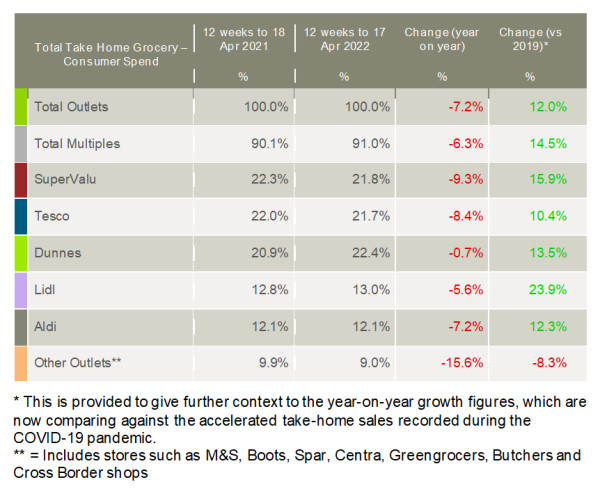Kantar’s latest take home grocery figures for Ireland show that sales fell by 7.2% over the 12 weeks to 17 April after grocery price inflation hit its highest level since September 2013 at 4.7%.
Emer Healy, senior retail analyst at Kantar, commented: “The impact of grocery inflation is being felt widely across store shelves and consumers will be noticing the effects on their budgets. Foods like cooked poultry, bread, pasta, and butter have seen some of the biggest jumps. The average household is facing a €330 price increase on their annual grocery bill, and 23% of households say they are now struggling to make ends meet when it comes to their weekly food shop. Retailers are responding to the rising price of goods, focusing their efforts on offering everyday low prices for shoppers.”
For the first time since the pandemic began, Kantar noted that sales in Ireland were in decline by 5.2% compared with two years ago, as the period now includes the start of the first lockdown when only essential shops were allowed to open. Healy said: “The pandemic might no longer be the first thing on shoppers’ minds, but we’re still seeing its effects on the grocery market as life gets back to normal. The number of supermarket trips made each month has continued to fall, with shoppers making 3.5 fewer visits on average than this time last year when COVID-19 restrictions were much tighter.
“The average spend per buyer has also fallen significantly by €144 as consumers eat more meals out of the home. On top of that, the types of items we’re buying have changed too. Sales of instant hot snacks and frozen pizzas are growing by 9% and 4.3% respectively over the last four weeks as shoppers turn to quick and easy meals now that many of us are back in the office and juggling school runs again.”
Meanwhile, the online market in Ireland continued to grow over the latest four week period, with sales up by 3.9% as shoppers spent an additional €2m. The channel’s market share is now 3.3 percentage points higher than the same 52 week period in 2019. Healy commented: “Many people became more reliant on online shopping over the course of the pandemic, and this has fitted in quite naturally with our busier schedules post-Covid. In the context of rising prices, it also allows consumers to be more considerate as they add items to their basket. While people are buying less in stores, the average number of items being purchased online is actually on the rise, growing by 3.2% year on year.”
All the major retailers saw take-home grocery sales fall year-on-year over the 12-week period. Dunnes retained its position as Ireland’s largest grocer, holding a 22.4% market share. It was bolstered by the largest influx of new shoppers this period, who contributed an additional €56.8m to its overall performance.
SuperValu holds a 21.8% share of the market with Tesco close behind on 21.7%. Lidl and Aldi account for 13.0% and 12.1% of the market respectively.

NAM Implications:
- This also has to be a reflection of uncertainties:
- Lockdown & Ukraine-Russia supply chain disruption
- Brexit fallout, especially NI protocol
- Job security…
- Meanwhile, discounters a reflection of right place, right time growth.




